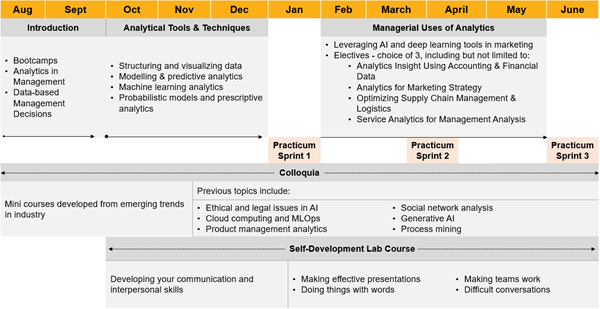What is management analytics?
Management analytics involves developing a precise understanding of the factors influencing managerial decisions, and designing data and analytical solutions to support these decisions.
It encompasses the multiple skills needed to extract insights from real-world business data, including:
- Acquiring a deep understanding of the managerial problem
- Identifying the data sources and create analytical data sets
- Designing, validating and implementing analytical solutions
- Communicating your results effectively
During the program, the Management Analytics Practicum will provide an opportunity to gain in-depth experience through a real-life managerial problem.
Below is a simplified view of your time in the program.
Click to view full-size image.

The Rotman Master of Management Analytics
The MMA program is one academic year in length, running from August to the end of June. The program is structured so that you initially focus on the tools and techniques before moving on to the application of analytics to management situations.
Introduction
(August to September)
Familiarize yourself with Rotman and gain an overview of the topics you will be covering during the program.
Analytical Tools and Techniques
(October to December)
In this term, students learn about a wide range of analytic tools, ranging from simple predictive models to more complex statistical models of learning to simulation-based tools.
Managerial Uses of Analytics
(February to May)
This term looks at the typical challenges organizations face, and whether data can be used to solve them. It considers the types of data available in different sectors and departments, and how they can be used to meet organizational objectives.
Students will study 1 core course, as well as 3 electives.
Electives
"The MMA curriculum is well designed, with the first semester focusing on hard-core technical skills and the second on applying data science to solve finance, marketing and operation challenges."
-Yiran (Margaret) Liu, MMA '19, Data Scientist, Artificial Intelligence and Machine Learning team, Customer Insights, Data and Analytics, Scotiabank
(September to June)
The practicum provides an opportunity for student teams to engage with a real-world business problem. You will devise an analytical approach to solving a managerial issue and working with your counterparts in the organization, present a design for the analytical data set and model development, then execute and present results.
The courses within the program, topics covered in the colloquium and other resources at Rotman will help you in producing the best possible solution to managerial challenges during your practicum.
The following are a few of the organizations that have provided practicum projects:
- BMO
- Canadian Tire
- FreshBooks
- Government of Ontario
- Hudson's Bay Company
- IG Wealth Management
- Maccabi
- Payments Canada
- Rogers
- Scotiabank
- TD Bank
- Teranet
- Unilever
- Unity Health
- Veeva
(August to June)
A series of mini-courses throughout the program exposes you to current trends and topics. The areas covered are reviewed annually to ensure the most important issues are covered. Certain topics, such as ethics, will be covered each year.
The colloquia from previous years include:
-
Ethics in Data Analytics and AI
- Social Network Representation
- Analytics for Customer Relationship Management
- Analytics for Detection of Fraud and Money Laundering
- Cloud computing and MLOps
- Healthcare analytics
Professional certification
As analytics matures as a profession, gaining professional certification is becoming increasingly important. While obtaining professional certification is not a program requirement, you will be supported and encouraged to write professional certification exams for organizations such as SAS.